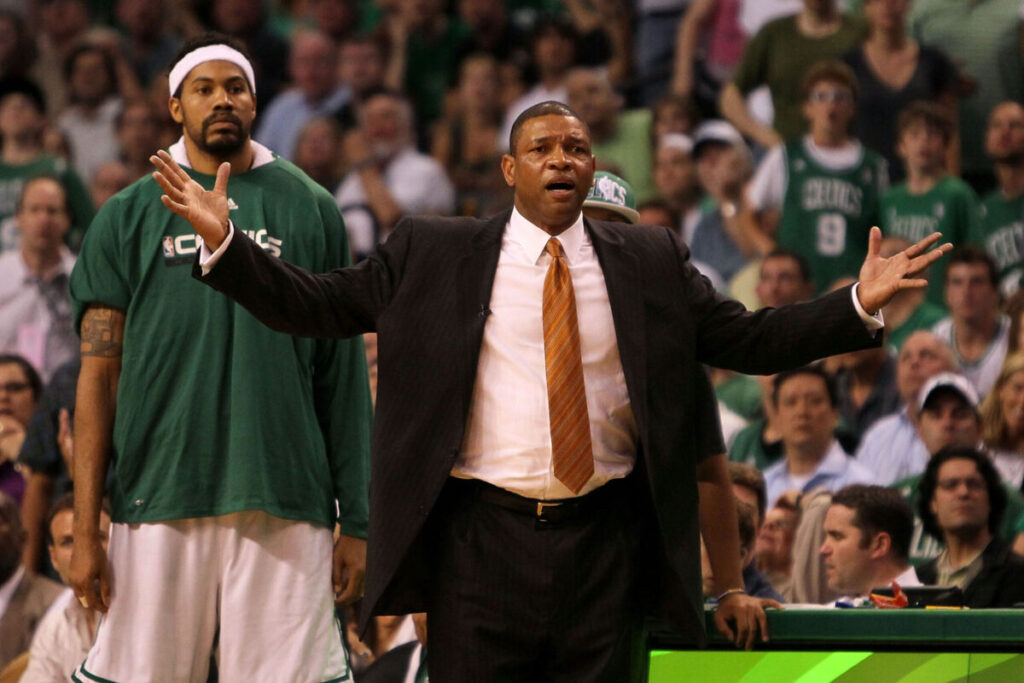Being a devoted NBA enthusiast naturally sparks strong opinions about Doc Rivers. Some hail him as one of the league’s most accomplished head coaches, lauding his role in harmonizing Kevin Garnett, Paul Pierce, and Ray Allen during their inaugural season with the Boston Celtics.
Others swiftly recall certain postseason letdowns following his departure from Boston. Veteran fans reminisce about Rivers, a resilient and astute former NBA guard who excelled in orchestrating offensive plays.
Regardless of the prevailing sentiment, there’s no denying that he has carved out a captivating career in basketball, rendering a Doc Rivers biography a must-read.

Glenn Anton Rivers – The Childhood
Glenn Anton Rivers, famously known as Doc Rivers, was born on October 13, 1961, in Chicago, Illinois. His parents, Betty and Grady Rivers played a significant role in shaping his early life.
Doc Rivers, a former NBA player and coach, has openly discussed the impact of his parents on his upbringing, particularly highlighting his father’s influence during times of social unrest in the United States.
Grady Rivers dedicated more than three decades to a career in law enforcement, instilling in his son the virtues of discipline and adhering to a principled path. Doc Rivers not only inherited his passion for basketball from his father but also had athletic relatives who left their mark on the sports world, including his uncle Jim Brewer and cousin Byron Irvin, both former NBA players.
Additionally, his cousin Ken Singleton enjoyed a respected career as a Major League Baseball player. Doc Rivers has since transitioned to a broadcasting role after his coaching career.
Proviso East High School
During his tenure at Proviso East High School, Doc Rivers, a former NBA head coach and guard, displayed his basketball prowess, and he remains attentive to the team’s progress today.
While he doesn’t actively seek acknowledgment, Rivers played a pivotal role in enhancing the school’s reputation as a premier basketball institution in the late 1970s. Proviso East has consistently cultivated several NBA players, including Michael Finley, Steven Hunter, Shannon Brown, and more, solidifying its legacy in basketball history.

Doc Rivers – College
Doc Rivers, the former NBA coach, and guard, naturally gravitated towards choosing a Midwest college for his basketball journey.
While DePaul, due to its proximity to his hometown, and Notre Dame, with its storied basketball legacy, were both under consideration, Rivers ultimately decided to join Marquette University in nearby Wisconsin.
His tenure with the Golden Eagles proved remarkable, as he set records during his freshman year and guided the team to two NCAA tournament appearances.
Playing Days
Atlanta Hawks
During his playing days with the Atlanta Hawks, Doc Rivers contributed significantly to the team’s respectable run in the 1980s under head coach Mike Fratello. The Hawks assembled a promising young core in the early part of the decade, featuring Rivers alongside Dominique Wilkins and Randy Wittman.
Despite only earning one All-Star selection, Rivers played a pivotal role in the Hawks’ success, helping them reach the playoffs in six of his first eight seasons with the team. Known for his prowess in steals and notable assist contributions, he consistently ranked among the league leaders in these categories.
However, the Hawks faced formidable Eastern Conference rivals like the Boston Celtics and Detroit Pistons, which hindered their championship aspirations. Consequently, Atlanta initiated trades to rejuvenate the roster, sending Doc Rivers to the Los Angeles Clippers.
Los Angeles Clippers
Rivers’ arrival in Los Angeles proved beneficial, stabilizing a tumultuous 1991-1992 season that saw the Clippers undergo three coaching changes. This move marked the team’s first playoff appearance in franchise history since relocating from Buffalo in 1978.

New York Knicks
Despite making an impact with the Clippers, Rivers was later traded to the New York Knicks, a team with legitimate championship aspirations. Joining the Knicks during the 1992-1993 season, Rivers started 45 games, forming an effective point guard duo with Greg Anthony.
However, the Knicks’ journey to the Eastern Conference Semifinals and Finals was thwarted by the dominant Michael Jordan and the Chicago Bulls.
Unfortunately, this marked the concluding meaningful stretch of Rivers’ playing career, as he suffered a torn ACL in December 1993, limiting him to just 19 games for the Knicks that year.
In 1994-1995, Rivers briefly appeared in three games for New York before being waived and subsequently picked up by the San Antonio Spurs.
San Antonio Spurs
He spent the final two years of his playing career with the Spurs, maintaining relatively good health while assuming a reduced role in basketball operations during the twilight of his NBA career.
First Coaching Job – Doc Rivers & The Orlando Magic
Following his retirement from playing in the NBA, Doc Rivers transitioned into a role as an NBA analyst on TNT’s broadcasts. Given his esteemed reputation within league circles, it was only a matter of time before he made a return to the NBA in some capacity.
While he had opportunities to join front offices, Rivers ultimately decided to focus on coaching. In June 1999, the Orlando Magic took a chance by hiring Rivers, despite his lack of prior experience as an NBA head coach.
Rivers faced some challenging circumstances during his tenure with the Magic, including the absence of Grant Hill for most of his time in Orlando. Nevertheless, he managed to guide an undermanned roster, led by the emerging star Tracy McGrady, into the postseason in three out of four full seasons, showcasing his coaching prowess and ability to make the most of the situation.
First Postseason Success – The Boston Celtics
Despite Doc Rivers’ dismissal following a challenging 1-10 start with the Orlando Magic in the 2003-2004 season, his reputation remained highly regarded within the NBA. Consequently, the Boston Celtics swiftly recognized his coaching prowess and appointed him as their head coach in the subsequent season.
Taking over the Celtics, Rivers inherited a team situated in the middle tier of the league. While Paul Pierce shone as a bona fide All-Star, uncertainties loomed, including the future of Antoine Walker.
In his initial year as head coach, Boston made the playoffs, but the following two seasons saw the team struggle, putting Rivers in jeopardy as a promising yet underachieving young coach.

However, the turning point arrived in June 2007. General manager Danny Ainge made bold moves, trading young talent and draft picks to acquire Kevin Garnett and Ray Allen. With this transformation, Rivers transitioned from nurturing young players to becoming a tactician, guiding accomplished veterans in their quest for a championship.
Boston embarked on an exceptional campaign, facing and surmounting early postseason challenges.
In 2008, they emerged victorious in the NBA Finals against the Los Angeles Lakers and Kobe Bryant, capturing the championship in a hard-fought seven games.
Although the Celtics came tantalizingly close to securing another title in 2010, they ultimately fell short in a seven-game series against their arch-rivals, the Lakers, highlighting Rivers’ postseason success as a coach.
Los Angeles Clippers
Doc Rivers, renowned for his coaching prowess, faced a pivotal moment in his career as head coach of the Boston Celtics. The Celtics, with their aging core, remained perennial playoff contenders. Still, Rivers yearned for a fresh challenge, leading him to the Los Angeles Clippers. There, he assumed dual roles as president of basketball operations and head coach, an exceptional feat that left an indelible mark.
Recognizing the value of a strong guard, Rivers had the privilege of coaching the exceptional Chris Paul during his Clippers tenure. Under his guidance, the team played an electrifying brand of basketball, with Paul orchestrating plays for athletic big men like Blake Griffin and DeAndre Jordan. The sharpshooter J.J. Redick further complemented their offensive prowess, keeping opposing defenses honest.
Despite immense talent and lofty expectations, the Clippers, under Rivers, fell short of the ultimate goal, never getting past the second round.
A significant setback occurred in the 2015 Western Conference Semifinals, where they squandered a 3-1 series lead against the Houston Rockets.

However, the Clippers maintained their faith in Rivers as they transitioned away from the Chris Paul era, embracing a new era of Clippers basketball with the dynamic wing duo of Paul George and Kawhi Leonard. With these stars on the roster in the 2019-2020 season, the team aspired to contend for an NBA championship.
Despite a promising start, including dispatching the Dallas Mavericks in the 2020 playoffs’ first round, the Clippers encountered unexpected hurdles against the Denver Nuggets led by Nikola Jokic.
Despite holding a 3-1 series lead, they suffered a stunning seven-game defeat in the Western Conference Semifinals and couldn’t advance past the Nuggets. This loss, coupled with the one endured five years prior, lingers in the collective memory, shaping Rivers’ coaching legacy.
Philadelphia 76ers
Doc Rivers, a seasoned NBA coach, took on a new challenge with the Philadelphia 76ers. The 76ers entered the 2020-2021 season as one of the Eastern Conference favorites, with high hopes that Rivers could propel the team further than his predecessor, Brett Brown.
However, much to the surprise of many, the 76ers couldn’t advance past the emerging Atlanta Hawks in the second round of the playoffs. This unexpected exit was marked by a significant moment when Ben Simmons passed up an open layup in the decisive Game 7, sparking speculation about his future with the team, a storyline that extended into the 2021-2022 season.

Despite the uncertainty surrounding Simmons, superstar center Joel Embiid continued to excel, establishing himself as one of the league’s premier players. His outstanding performance buoyed the team while the front office deliberated on how to address the Simmons situation. Eventually, the 76ers traded Simmons to the Brooklyn Nets in exchange for James Harden.
Philadelphia’s postseason fortunes took another turn in the following year, as they were eliminated in six games by the Miami Heat in the second round. Unfortunately, Embiid was sidelined for the first two games of the series due to an orbital fracture in his face, which impacted the team’s performance.
Had Embiid been available for the entire series, it might have altered the outcome.
Something New – Doc Rivers In A Broadcast Booth
Doc Rivers, the former NBA guard and one of the most accomplished coaches in NBA history transitioned into a broadcasting career following his coaching stints.
Doc lent his basketball expertise to TNT‘s broadcasts, where he provided insightful analysis and commentary. His experience as a player and coach, combined with his deep understanding of the game, made him a valuable asset in the world of sports broadcasting. During this phase of his career, Doc Rivers continues to contribute his knowledge and passion for basketball to a broader audience.
Why do they call him Doc Rivers?
In college, Marquette assistant Rick Majerus labeled him with a nickname that would stick forever, “Doc”. His nickname came from his “Dr. J.” shirt worn in honor of Julius Erving, one of the NBA legends.
How many rings does Doc Rivers have as a coach?
Doc Rivers has one NBA championship ring as a coach, which he won in 2008 as the head coach of the Boston Celtics.
Does Doc Rivers have any siblings?
Yes, his brother is Grady Rivers Jr. He attended Southwestern Iowa University and is a retired fireman. He’s always been a valued member of the family and local community due to his kindness and helpfulness. Grady is currently engaged in real estate investments. He is a skilled public speaker, strategic planner, and team builder with good customer service abilities.






